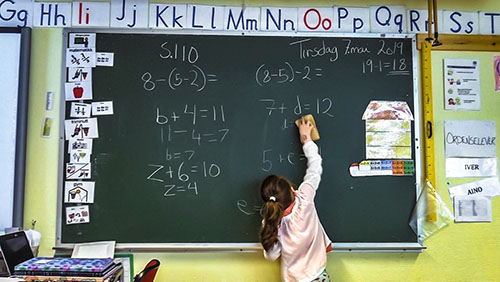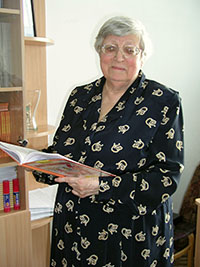They were among the first to adopt a new system for teaching mathematics in primary school (developing mathematics). The students at Høle Barne- and junior high school are today among the best in Norway. The mathematical background gained in primary school did not disappoint.
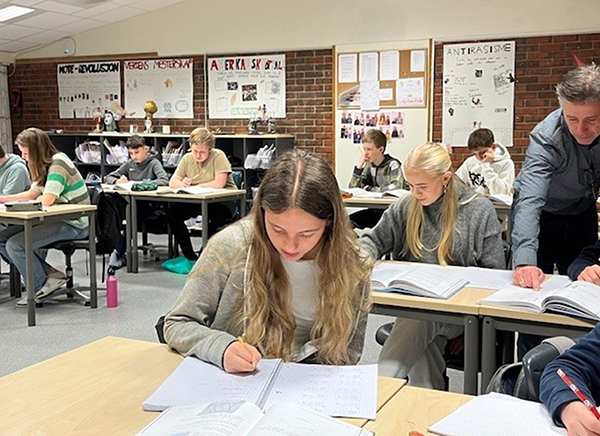
This was the best public school in accounting
Ninth grade at Høle Barne- and secondary school got the best average in accounting of all public Norwegian secondary schools in national tests this year.
At Høle Barne- and junior high school at Høgsfjorden in Ryfylke, where Norway's best students are considered 9. trinn, if we exclude private schools. Norway's Science and Technology Youth School Sandvika is enthroned at the very top, and among the top ten are all private schools, outside the secondary school at Høle in sixth place: Les mer…
Question answer,no
"I am the mother of a child in the 6th grade who is homeschooled. I am looking for an exercise book in mathematics adapted to the competence objectives. I found your book and read a bit about the educational background and think it is suitable for us. Now I wonder if we can use the book without other children and to reach the competence goals for the stage? We have already worked with decimal numbers and now need geometry.”
Difficult,sv:
The books can be used alone (although having other children to discuss with can be an advantage). They are also suitable for self-study, but this assumes that the student is quite self-driven. Most people probably need some guidance from an adult. Les mer…
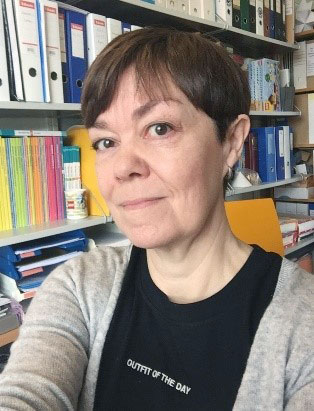
Systematic work with text assignments in developmental training
Systematic work with text assignments in developmental training Systematic work with text assignments in developmental trainingSystematic work with text assignments in developmental training (Systematic work with text assignments in developmental training. Systematic work with text assignments in developmental training) Systematic work with text assignments in developmental training.
Introductions to Teacher's Guides and Excerpts from the Classroom
Mathematics 5-7 is a textbook based on Vygotsky view of learning and Zankovs teaching model.
Mathematics 5-7 is a thorough textbook that puts great emphasis on observation, analyse og logisk tenkning. Here we find both tasks that are suitable for co-operation and tasks that are suitable for individual work. The work provides excellent opportunities to create a lively dialogue in the classroom and to implement a custom instruction that is interesting and instructive for all. One of the main objectives is that students should learn how to learn.
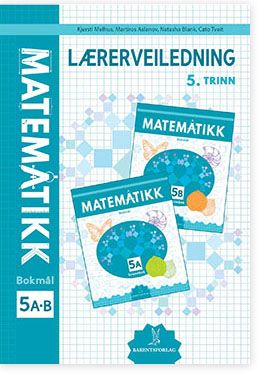
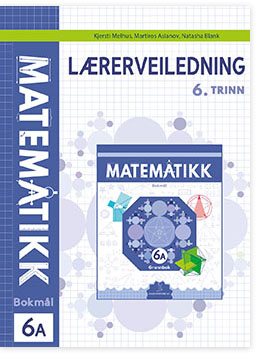
Question answer
You say that discussion is central to UOM (Evolving training in mathematics) and that the material is clarified and elaborated through discussion in common. How can the training then be carried out if the schools have to close and the pupils have to have home tuition?
In accordance with Zankov's model, the assignments are made so that the student constructs knowledge himself. Therefore, it is important that each student has a basic book and exercise book. In basic books, the mathematical content is developed systematically, and emphasis is placed on presenting the material in an inductive way so that both weak and strong students find something that suits them and that promotes their development. Special attention is given to the choice of tasks (most are problem-solving tasks).
I do not find mathematical subjects such as. geometry in the table of contents of the books. This means that the textbook does not contain geometry?
In, that does not mean. The headlines show only one main line. This textbook is organized in a different way than what is usual in other Norwegian textbooks. Each chapter consists of assignments. These are grouped into blocks, where each block consists of 2 to 4 tasks. It is assumed that the students work with such a block in a teaching session. The one task in each block is a main task and corresponds to a topic to which the task is linked.
Here they learn Russian mat - see how passionate the age of ten are!
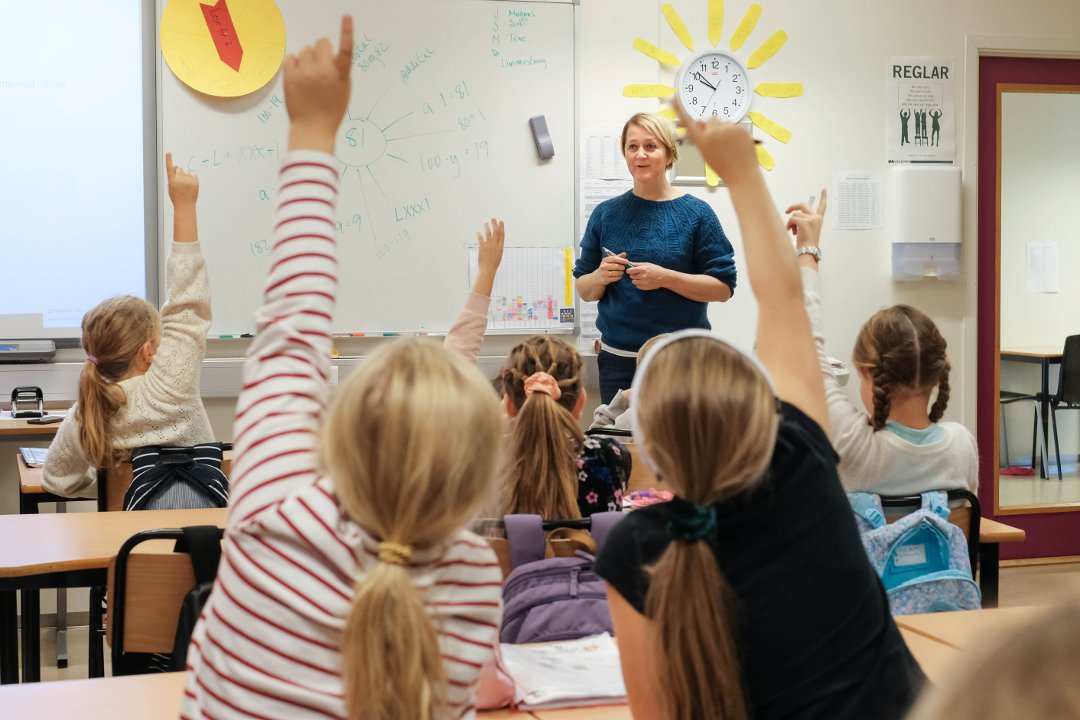
IVRIGE: The most enthusiastic letter almost from the chair because they have thought out a new calculation method to arrive at 81. Math teacher Trine Nevland Risdal trying to get everyone to respond. Foto: Hilde Anette Ebbesvik
By Hilde Anette Ebbesvik
Published: 04. november 2019
Since the first grade class at Varhaug skule learned math by the Russian method. We got to join a lesson which all contributed in hours.
- Which number should we have as of today, asks the math teacher Trine Nevland Risdal students in the fourth grade at Varhaug skule.
Trym suggest 81, and so must students use addition, multiplication, division, subtraksjon, equation with unknown, compound inequalities, relatives, Roman numerals and neighboring numbers to find a calculation being 81.
Almost all the students raise their hands, and propose calculations that a x 1 er lik 81, some say a divided 9 becomes 9, while others use Roman numerals to find a calculation.
Russian mat, or developing training which they gradually begin to call it, is about using various means to locate the answer to.
Here'm not talking about students crocodile sign, ganging and a curly line. Here it goes more or less than, multiplication, and curved lines.
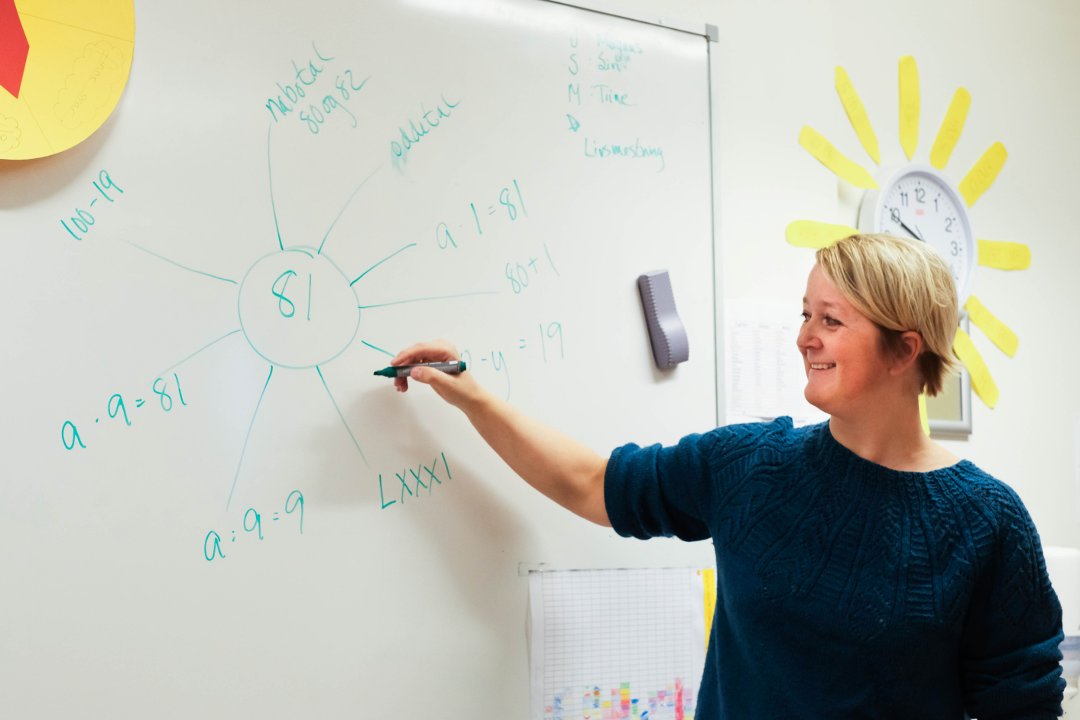
ENGAGED: Math teacher Trine Nevland Risdal almost can not write fast enough, so many suggestions she gets on the calculation that gets response 81. Foto: Hilde Anette Ebbesvik
A typical math class after the Russian method begins with this type of exercise called grublis, then there is new material students are doing two and two and then quits hours of working with the booklet most of which are at different levels.
Amid hours, they have a kind of activity, where students suddenly pops up and stands on a couple of seconds clear every four to dance to Shakira's "Waka waka".
- They work so concentrated while we keep on, so they must now run from slightly, says the enthusiastic math teacher.
Question answer,no
Suitable textbook for developing mathematics to the requirements set for mathematics in the new curriculum 2020?
As of today fits the textbook very well to the core elements set out for mathematics in the new curriculum. When it comes to the competence goals, it is difficult to say anything before they are finally adopted. If the final plan includes competence for each step, it will of course be natural that there is a need for a certain audit.
our writers
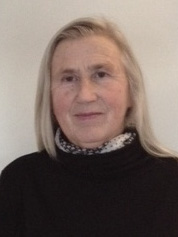
Gerd Inger Moe
Gerd Inger Moe retired teacher / teacher. She has taught at the primary level and been the practice teaches at the University of Stavanger. from autumn 2009 to 2015 she has worked with evolving training in mathematics in cooperation with the municipality of Sandnes and University of Stavanger. Hun er nå engasjert av Sandnes kommune og UiS i forbindelse med implementering av Utviklende opplæring i matematikk. In recent years she has run extensive training and guidance of teachers.
Natasha Blank
Natasha Blank holds a PhD in pure mathematics. She has worked in teacher education at the University of Stavanger ago 1997. She has over 30 years of broad teaching experience of Ukraina, United Kingdom, US and Norway. From 2009 in cooperation with Gerd Inger Moe she began to implement Zankovs model in Norway.
These students will follow a completely new race in mathematics: Higher level with the Russian example
First-graders at Sandnes school to learn math using the method of the famous Russian psychologist Leonid Zankov, and shall be accompanied in the footsteps of schoolchildren across the country.
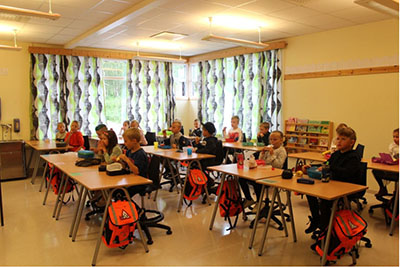
- I understand that it has taken some time for schools in Sør-Varanger to get a grasp on this method. When one looks in the books, so, students get a bit like "ai, what is this". I understand that it is something completely new for both teachers and parents. But with training and education goes fine, mener Therese Hagfors, project manager for the new mathematics project at Sandnes and Bjørnevatn school ...
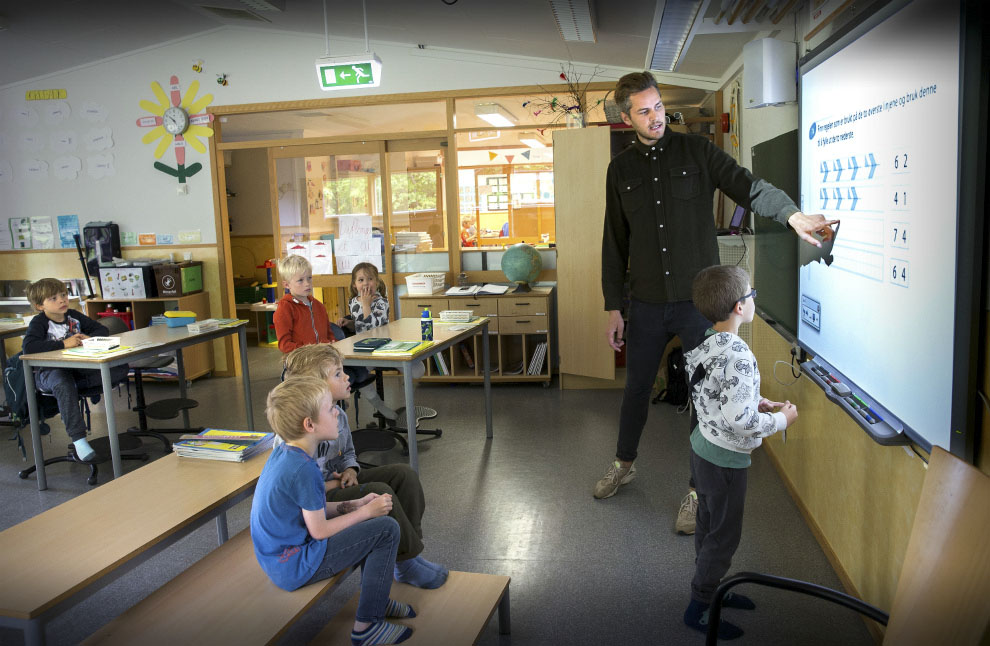
Developing mathematical education - challenges for the teacher,,no,Developing mathematical education - Challenges for the teacher. Developing mathematical training,,no
Evolving training in mathematics, known Russian maths, is a method that gets increased support. The scheme may, however, pose challenges in relation to the teacher's practice.
Here we will explain the theory and the key principles that underlie the approach Evolving training in mathematics (also known as "Russian mathematics"), and show how such an approach to begin training can challenge some widespread educational beliefs and habits. It begins to be quite a few Norwegian schools that have adopted this method and the Norwegian edition of the textbook, and some teachers might get problem when they will practice such a project without the simultaneous change their praksis.¹ We do not go into detail on teaching and progression, and to the extent that we draw this into, is the first class we show til.²
A lesson with evolving training in mathematics,no
Through courses and meetings with teachers, there has been a lot of questions and problems when it comes to practical implementation of Evolving training learning in mathematics,,no,Here are some factor that may be of interest to many,,no,Preparation and implementation,,no,In the teacher's guide, there is a proposal for an outline of the syllabus on year,,no,and weekly basis,,no,It is good to follow,,no,The tasks for each week is allocated to each day,,no,The teacher must familiarize themselves with the tasks and prepare for in terms of formulating questions,,no. Her følger noen moment som kan være av interesse for mange.
Expert forum,no
Barentsforlag har åpnet den nye rubrikken «Faglig forum» hvor Gerd Inger Moe presenterer korte notiser knyttet til praktisk gjennomføring av Utviklende opplæring i matematikk.
Vi oppmuntrer lærerne til å komme med problemstillinger som de føler er utfordrende.
Tanken er …
FIRST STEPS IN logic and math WORLD,,no,banner-1,,en
Norwegian authorities are keen to develop mathematical understanding in kindergarten,,no,This is part of an increased focus on mathematical competence at every step,,no,and starting in kindergarten,,no,Much of children's mathematical understanding submitted before they are,,no,years old,,da,and does not come by itself ..,,no. Dette er en del av en økt satsing på matematisk kompetanse på alle trinn, og med start i barnehagen. Much of children's mathematical understanding submitted before they are,no 6 år gamle, og kommer ikke av seg selv...
Hva med de svake elevene i dette opplegget?
I skolen finnes elever med ulike erfaringer, abilities and personal qualities. Some have diagnoses. Others have difficult home conditions. Whatever assumptions.
What are minimum academic requirements for students in 1st-3.trinn,no?
One of the principles in Evolving training in mathematics is so,,no,Systematic and targeted development of every child,,no,The principle focus of a mandatory minimum and then the maximum individual development. It is desirable that each student develops a maximum both socially and academically. Through jobbing in class and cooperation with each other, students will develop an increasing understanding of the concepts and insight into their own and others' ways of thinking. Students are constantly developing greater understanding of numbers,,no:
Systematisk og målrettet utvikling av hvert eneste barn
The principle focus of a mandatory minimum and then the maximum individual development,,no,It is desirable that each student develops a maximum both socially and academically,,no,Through jobbing in class and cooperation with each other, students will develop an increasing understanding of the concepts and insight into their own and others' ways of thinking,,no,Students are constantly developing greater understanding of numbers,,no,various patterns and getting increasingly hear additional suggestions on tasks,,no,The overall development of the child with various activities,,no,effort is being made all the time,,no,All children attending,,no. Det er ønskelig at hver enkelt elev utvikler seg maksimalt både sosialt og faglig. Gjennom jobbing i klassen og samarbeid med hverandre vil elevene utvikle stadig større forståelse av begreper og innsikt i egen og andres tenkemåter. Elevene utvikler hele tiden større forståelse for tall, ulike mønster og får stadig høre flere løsningsforslag på oppgaver. Den generelle utviklingen av barnet med ulike aktiviteter, logisk tenkning, observasjon, analyse, memorering og kreativitet, jobbes det med hele tiden. Alle barn deltar.
Hvordan foresatte kan hjelpe til?
Parents are important partners and supporters of children's education and development,,no,Good cooperation between school and home can make a difference in children's well-being and learning,,no,Evolving training in mathematics can be a challenge and uncertainty about how parents can help their children with homework and learning of concepts at school,,no,What the teacher can do to get this best to work,,no,Before the parents, it is customary to send home a letter containing various information,,no. Good cooperation between school and home can make a difference in children's well-being and learning.
Rammer og læringskultur Utstyr i klasserommet
Frames,,da,Working with evolving training in mathematics requires structure and good frames in the class. & Nbsp; Time should be learning. & Nbsp; Throughout the session should be more challenging tasks worked on. & Nbsp; The teacher makes sure that it achieved most professional focus, for example by,,no,Distinguishing breaks / hour,,no,Utilizing the time - clear away all incidentals / disorders,,no,Helping students to have good order in student shelves to find books and equipment quickly,,no,Keeping high learning pressure,,no,tight allocation of time,,no:
Working with evolving training in mathematics requires structure and good frames in the class. Time should be spent learning. Throughout the session should be more challenging tasks Efforts.
The Holmboe prize 2024 to Pål Harald Hansen: "A pioneer in mathematics education"

Mathematics teacher Pål Harald Hansen receives the Holmboe prize for his innovation
work with exploratory teaching and his ability to inspire and guide
students to achieve exceptional results. the sea…
Maths teacher wins prestigious award

has won the Holmboe prize 2024!
The super teacher
Pål Harald Hansen is a teacher specialist in mathematics at Sandnes- and Bjørnevatn school since
2019, and has had particular responsibility for the school's development project within developing education (also known as "Russian mathematics").
Nordic Championship. the sea…
This is how they work to reverse the negative maths trend: - I want to be very good

Norwegian 15-year-olds are record poor in maths, but among the younger ones the joy of math is great. - You can fall off if you lose something on the way, says the professor. the sea…
Norwegian masters in mathematics 9. class at Sandnes and Bjørnevatn school in Sør-Varanger are Norwegian masters in mathematics
The ninth graders won gold in the Unge Abel mathematics competition, and are thus ready for the Nordic final at the end of May.
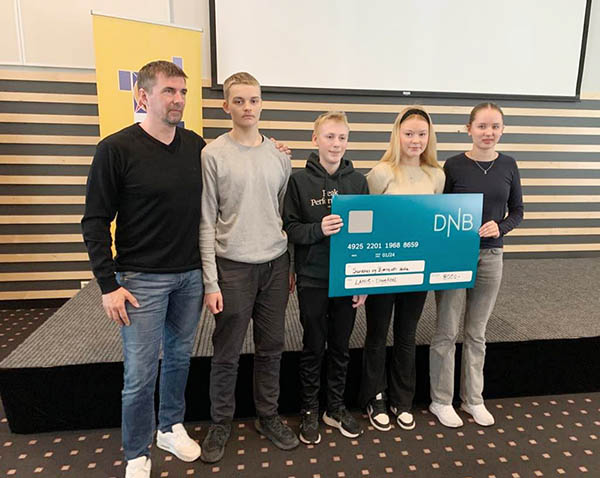
Headmaster Tony Pedersen says the whole school is celebrating the victory.
- It is a great achievement, and then it shows that competence and quality produce results in teaching.
We are incredibly proud of the effort they have made, and this is a good example of work and effort paying off.
NRK 21. april 2023
Sandnes and Bjørnevatn school
Winner of MatteNM and ready for the Nordic final in Wasa at the end of May. The students Jakob Rundtom, Silas Fløystad, Emine Dørmenen, Iina Dikkanen and teacher
Pål Harald Hansen is now ready for the Nordic Final in Wasa at the end of May
The Crown Prince congratulates the Abel Prize
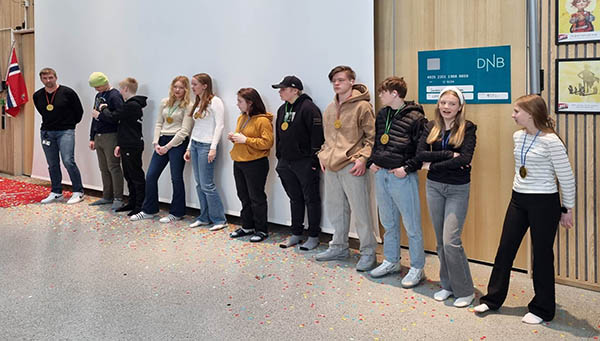
Digital textbooks for schools
Barentsforlag in collaboration with BrettBoka offer digital textbooks in developing mathematics for schools. These textbooks can be used on PC (Windows 10), Ipad, Chromebook (Android), Mac and webutgaven.
About Brett Boka

Brett book is a platform for digital textbooks for use in education and training / courses. The service is used by schools, companies, candidates, students and other.
Textbooks of Brett Boka has additional features including it's possible to read out the text of the books with the help of synthetic speech. This feature is useful among others for dyslexics.

Min erfaring som lærer med ’utviklende læring’
Som mangeårig lærer, har jeg flere ganger hatt første trinn og begynneropplæring i matematikk. Hver gang har jeg opplevd at elevene er i stand til å møte en betydelig raskere progresjon i faget. Selv om jeg økte tempoet, I missed more challenging tasks and more life in class.
Les mer…
Experience with Developmental training in mathematics at Sandnes and Bjørnevatnskole
Sandnes and Bjørnevatn schools have worked with Developing training in mathematics in 3 year. Here are their experiences with the scheme, not only in relation to students but also in relation to how it changed the teaching of teachers.
The presentation is made by Sør-Varanger Utvikling.
Theoretical and didactic principles behind developing training in mathematics
Here is a brief introduction to the theoretical and didactic principles that form the basis for developing teaching in mathematics (also called Zankov's model). The presentation is intended to help teachers who teach, or thinking of teaching, after the teaching material Mathematics.

The presentation is made by Kjersti Melhus, senior lecturer at the Department of Primary School Teacher Education, idrett og spesialpedagogikk ved Universitetet i Stavanger. Melhus is also a co-author of the textbook Mathematics 1-7 and has held many courses on developmental training in mathematics (UOM) for teachers.
Congratulations Varhaug school!
National tests
The students on 5. steps had national test in English, reading and arithmetic early this fall. The students delivered very good results! They are on the national average in English and reading, and far above the national average in account. These students are the first step that has had developing mathematics in 4 years before the test. We are incredibly proud!...
Varhaugbuen NR.4, 2020

Varhaug skule. Foto: Hilde Anette Ebbesvik
Parent course on developmental training in mathematics
We present Parents' course on developing education in mathematics. How can I as a parent help my child? A brief introduction to what developmental training in mathematics is, and what is emphasized and what principles the teaching is based on. There will be some examples of tasks and some tips you as a parent can use to help your child.

The presentation is made by Therese Hagfors. She works as an assistant principal at Sandnes and Bjørnevatn schools with responsibility for special education. She also works as a mathematics tutor at the school. She has taught mathematics in 20 years and has been involved in development work in relation to mathematics in Sør-Varanger municipality and has also been associated with the Mathematics Center. For 3 years ago, the school decided to start with Developmental Training in Mathematics, and started a project to implement Developing training in mathematics in all mathematics teachers at the school.
The teaching plan in mathematics
We propose the introduction of the teaching program Developing training in mathematics, what is emphasized in the learning process and what principles the teaching is based on.
Examples of some tasks are given, implementation and some conditions one should be aware of when working with this scheme.
The presentation is made by Gerd Inger Moe who is a retired general teacher / assistant professor. Hun har undervist på barnetrinnet og har vært praksislærer ved Universitetet i Stavanger. from autumn 2009 to 2015 she has worked with Developmental training in mathematics in collaboration with Sandnes municipality and UiS. She is now engaged by Sandnes municipality and UiS in connection with the implementation of Developing training in mathematics.
Question answer,no
Suitable textbook for developing mathematics to the requirements set for mathematics in the new curriculum 2020?
The principles behind this textbook is based on Vygotsky's views on training and fits very well to the core elements of mathematics in the new curriculum. In textbook dialogue (communication) central. Students are encouraged to talk and cooperation. Most tasks have an element of exploration and Troubleshooting, with appropriate difficulty pupils. The tasks provide excellent opportunities for the teacher to adapt the teaching. They are varied and developed in order to create curiosity and motivation.
The students learn to observe and distinguish what is important from what is insignificant. They learn to reason, reflect, abstract, generalize, justify and argue for results. They must represent their thoughts in different ways (oral, writing, visually, …). Learning Administration helps students develop different strategies and models through algorithmic thinking. They are able to apply their knowledge in a safe and independent way. Depth Learning and development is in focus - students learn to learn!
The mathematical knowledge areas are well covered - progress and distribution of the threads is very thoroughly thought. This textbook offers a lot more than the minimum requirements described under the individual steps. We want to keep since our main goal is a maximum development of every child.
There are also plans to develop additional digital teaching aids.
Here teach freshmen equations and advanced math: - Really easy!
75 Norwegian schools have begun to teach mathematics by Russian methods. That means higher level, better results and more diligent students.
- It's real simple, Rita says Elise Hansen from Sandnes school in Sør-Varanger.
Freshmen are learning about equations and algebra in maths lesson. Syllabus who really learned before in 6. og 7. klasse.
All 75 Norwegian schools have since 2014 embraced the Russian method of teaching mathematics, known as developmental mathematics.
The method was invented by Russian Leonid Zankov. He was a teacher and psychologist with definite ideas about how children learn best. In Russia taught mathematics on his way, and it has been found effective.
Question answer,no
How many schools in Norway have lessons in developing mathematics after Zankovs principles?
It is 75 schools (more than 5000 pupils) i 36 municipalities with teaching in developing mathematics.
Do you have any tips for how one should equip a classroom?
Garnish up classroom with math posters where content customized for each. It can be colorful posters that stimulates and creates curiosity or it can be self-made posters like. the definitions or summarizes any class have found. If pupils themselves making posters should these "quality assured" by the teacher so that the content is accurate. For younger grades should sequence of the natural numbers be as obvious to have on the wall like alphabet.
Regarding specification materials we would recommend to prioritize materials that have wide range of applications (f.eks. dice, counting pieces, pinner, etc.).
The questions are answered by Kjersti Melhus and Natasha Blank, University of Stavanger.
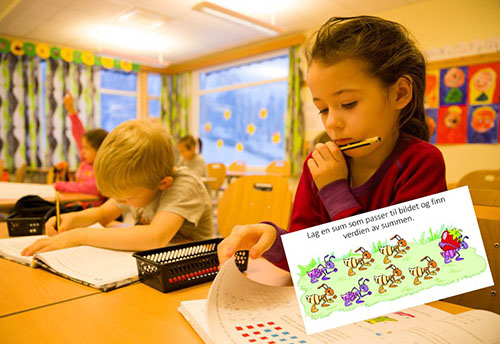
Can you solve math problems to Rita (6) and Iver (7)?
First graders Rita Elise Hansen and Iver Dørmænen Pedersen has had intensive mathematics teaching in their first school year. Can you solve their tasks?
- Mathematics is sublime, but the gym and recess are equally fun, Rita says Elise Hansen.
Mathematics Hours for her and the rest of the freshmen at Sandnes school in Sør-Varanger is the Russian model, with a textbook produced by Barents The imprint Kirkenes.
Rita sitter with zeal Dørmænen Pedersen. She is six and he seven years old.
- We walked along the nursery also. But we would not mathematics, says freshmen, who know each other well and sitting together in class.
- I'll start in the second grader, says Iver.
- I'll also, Iver. Even if you are seven and I six years, then we go the same class, responds Rita on the other side of the table.
See some of the tasks students are asked to solve the bottom of the case. Can you solve them?

Asheim was challenged by Jo,,no,in "Russian mathematics",,no,"Utdanningsnytt.no»,,no (2. trinn) i «russisk matematikk»
Da fungerende kunnskapsminister Henrik Asheim besøkte Vigernes skole i går ble han, i stedet for å snakke om statsbudsjettet, utfordret av Jo på 2. trinn til å gi mattehjelp.
Jo har nettopp fullført en oppgave som handler om former og figurer. Han har tegnet streker mellom ulike vesener som skal passe inn i forskjellige hus med varierende farger og utseende.
They do not seem math is hard,no
Having switched to Russian math education carved freshmen at Eide school sky high on the national survey sample,,no,"& Nbsp; Having switched to Russian math education carved freshmen at Eide school sky high on the national survey sample,,no.

GRIMSTAD,,en,- Now we're going in and having math,,no,Everyone has to find their rulers and sit down quietly,,no,Finger on your nose if you understood the message,,no,says teacher Eivind chart Tunsberg to,,no,increments Eide School in Grimstad,,no,the class of,,sv,Students comes running in after recess,,no,Together they counted into the classroom for math teaching,,no,But maths teaching at Eide school is not like other schools,,no,The small class has in fact replaced the usual mathematics teaching with Russian teaching methods,,no
– Nå skal vi inn og ha matte. Alle må finne fram linjalene sine og sette seg rolig ned. Fingeren på nesa om dere forsto den beskjeden, sier lærer Eivind Stabell Tunsberg til 1. trinn på Eide barneskole i Grimstad. Klassen på 11 elever kommer løpende inn etter friminutt. Sammen går de tellende inn i klasserommet for å ha matematikkundervisning. Men matteundervisningen på Eide skole er ikke som på andre skoler. Den lille klassen har nemlig byttet ut vanlig matematikkundervisningen med russiske undervisningsmetoder.



